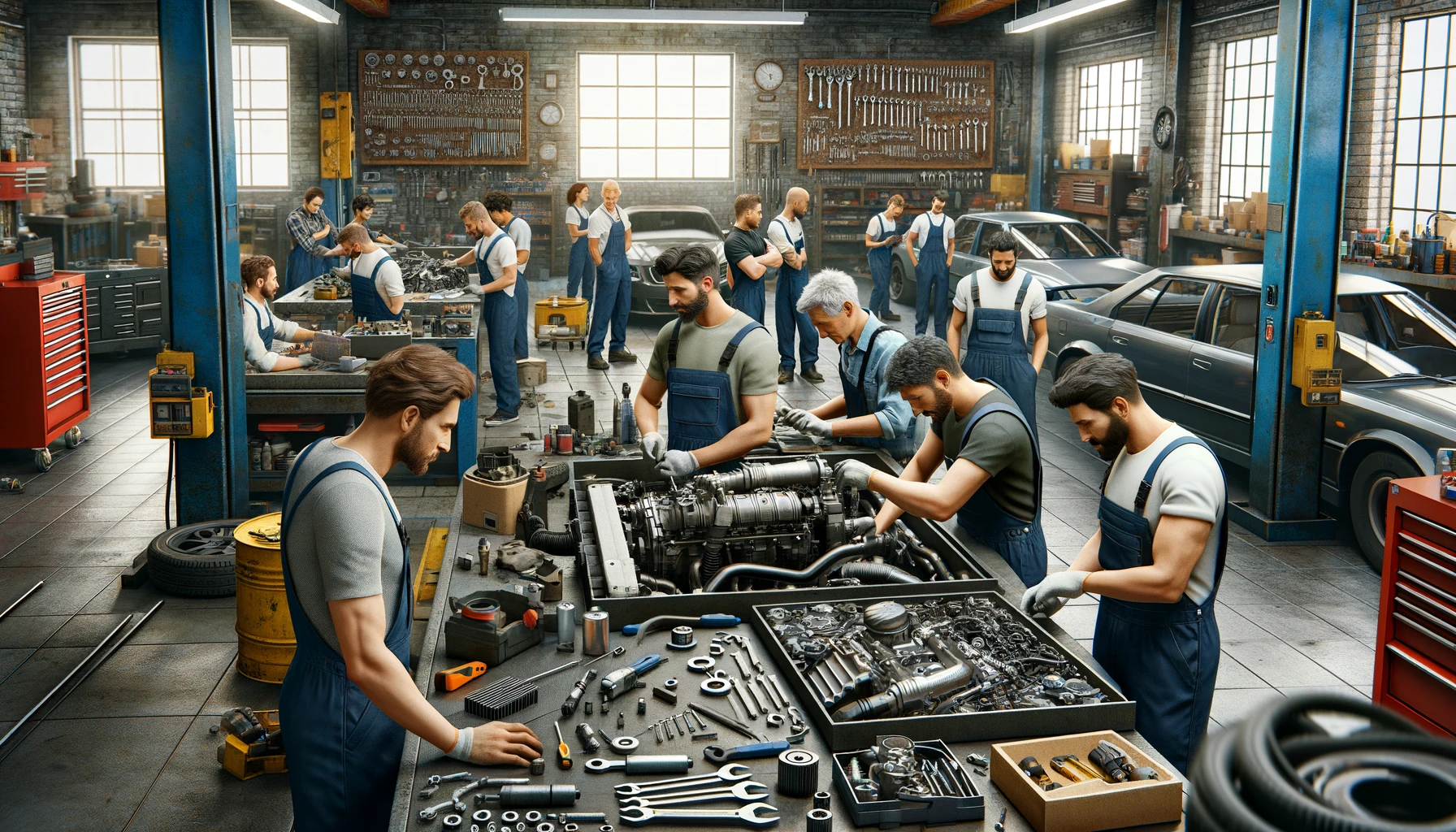Operating heavy machinery is a fundamental skill in many industries, from construction to manufacturing. The Machine Operator Course prepares professionals to work competently and safely, controlling equipment that requires precision and responsibility.
This article explores the essential aspects of these courses, the qualifications required, and the career prospects for those who choose this profession.
Machine Operator Course Basics
The machine operator course is designed to provide a solid foundation in operating techniques, mechanical knowledge and practical skills. Training begins with theoretical lessons on the operating principles of the most common machines in specific industries. In addition, an introduction to the working environment and safety regulations are given priority to ensure that future operators can carry out their duties without risk.
The instructors, often experienced operators or engineers, use teaching methods that range from detailed manuals to interactive lessons. Practical training on modern simulators and real machines allows students to apply what they have learned in controlled but realistic situations. This practical training is essential for developing the confidence and precision needed to operate large machinery.
Periodic assessments throughout the course help to ensure that students not only understand the theory, but are also proficient in practical skills. In addition, group discussions and case studies enrich learning by offering different perspectives and solutions to common problems in machine operation.
Required Qualifications for Machine Operators
To become a machine operator, it is essential to have certain qualifications that go beyond technical knowledge. Skills such as attention to detail, good motor coordination and the ability to follow complex procedures are fundamental. In addition, the ability to work under pressure and as part of a team are qualities that employers value.
Machine operator courses often require applicants to have completed basic education and, in some cases, specific math or physics courses. This is important, as many of the concepts used in machine operation involve calculations and an understanding of physical principles.
In addition, good eyesight and adequate physical condition are requirements for the safe operation of heavy machinery. Physical fitness tests and health examinations may be part of the selection process or admission to specialized courses.
Essential Equipment for Operator Training
Practical training in machine operation would not be possible without access to specialized equipment. State-of-the-art simulators offer students the opportunity to practice in a virtual environment that mimics real challenges without the risks associated with initial training on real equipment. In addition to simulators, technical schools generally have different types of machines available for training, each representing those most commonly used in local or global industries.
In addition to operating equipment, diagnostic and maintenance tools are used during the course, teaching operators how to carry out basic checks and repairs. This skill is crucial for minimizing machine downtime and ensuring their operational longevity.
Investment in educational technology and quality equipment reflects the educational institution's commitment to training qualified professionals. Therefore, when choosing a course, it is important to consider the infrastructure available and whether it meets the needs of the sector of interest.
Safety at Work: Priority in the Operation Course
Safety is the central pillar of the machine operator course. From day one, students are instructed in the importance of following strict safety rules to protect themselves and their colleagues. They learn about personal protective equipment (PPE), emergency procedures and how to deal with potentially risky situations.
Instructors with experience in the field emphasize the need for a proactive safety attitude, where accident prevention is always prioritized. Training includes simulations of emergency situations, where students must react quickly and correctly to mitigate risks. Familiarity with safety protocols becomes just as important as the ability to operate the machines.
This focus on safety not only protects operators, but also ensures the integrity of operations in the companies that hire them. Graduates of machine operator courses who demonstrate a solid commitment to safe working practices are highly valued in the job market.
Technology and Innovation in Machine Operation
Technology is transforming the way machines are operated, making operator courses more complex and technologically advanced. The introduction of computer-controlled machines and automation has increased the need for operators who not only know how to handle equipment, but also understand software and control systems.
The training now includes modules on basic programming and interpreting technical data, enabling operators to interact efficiently with advanced technologies. These skills are crucial for maintaining competitiveness in the industry and for being able to adapt to new methods and machines that continue to evolve.
In addition, innovations such as telemetry, which allows machines to be monitored remotely, and predictive maintenance, which uses data to predict failures before they occur, are becoming part of the course curriculum. This knowledge puts operators at the forefront of technology, ready to face the challenges of modern industrial landscapes.
Certifications and Licenses for Machine Operators
Having the appropriate certifications is crucial for any machine operator wishing to advance their career. These certifications, issued by recognized bodies, validate the operator's skills and knowledge, and are often legal requirements for operating certain types of equipment.
Machine operator courses generally prepare students to obtain these certifications through exams and practical assessments. Depending on the country and the type of machine, certifications can vary, but generally include tests of practical skills, safety knowledge and sometimes basic maintenance skills.
For operators, keeping up to date with certifications not only ensures compliance with safety standards, but also increases employability. Many companies prefer to hire certified operators because of their demonstration of professionalism and dedication to their profession.
Common Challenges in the Career of a Machine Operator
Although being a machine operator can be a rewarding career, it also comes with its own set of challenges. One of the main ones is the need for continuous updating. As new technologies are introduced, operators must learn to use new equipment and software, which can be a constant requirement for retraining.
Another significant challenge is the working environment. Operating heavy machinery often involves difficult conditions, such as working outdoors in adverse weather, or in noisy and dusty indoor environments. The physical and mental demands of these conditions can be intense, requiring operators to be in good physical and mental condition.
In addition, safety remains a constant concern. Even with rigorous training, the risk of accidents exists, especially if operators or their companies don't consistently follow the best safety practices.
The Importance of Preventive Maintenance on Machinery
Preventive maintenance is crucial for the efficient and safe operation of any piece of machinery. In the machine operator course, students learn not only how to operate equipment, but also how to carry out regular inspections and basic maintenance. These skills are essential for minimizing the risk of mechanical failures that can lead to production stoppages or, worse, accidents at work.
Operators are trained to spot signs of wear or problems in critical components and know when it is necessary to call in a specialized technician. This preventive awareness can save companies significant repair costs and ensure that machines operate at their optimum capacity for longer.
The Role of Simulation in Operator Training
Simulation plays a vital role in training machine operators, allowing them to experience a wide range of scenarios without the risks associated with training on real equipment. Advanced simulators can reproduce varied working conditions, from extreme weather to equipment failures, preparing students to react appropriately in real pressure situations.
This approach not only increases safety during initial learning, but also improves the quality of training by allowing certain tasks to be repeated until proficiency is achieved. In addition, simulation offers an effective way of testing and reinforcing operators' decision-making skills in a controlled environment.
Career opportunities after the Operator Course
After completing the machine operator course, career opportunities can be vast and varied. Graduates are qualified to work in multiple sectors, including construction, mining, agriculture and manufacturing. In addition to initial positions as machine operators, many professionals progress to supervisory roles, team management or even teaching.
Some careers may require additional or specialized knowledge, paving the way for certification courses or advanced training. The experience gained can also open doors to careers in related areas, such as equipment maintenance, logistics or operational planning.
Technological Advances and the Future of Machine Operation
The future of machine operation is closely linked to technological advances. With the growing adoption of automation and artificial intelligence, the role of the machine operator is expected to evolve significantly. These professionals will need to adapt to increasingly technological working environments, where the supervision and control of automated systems becomes as important as the physical operation of machines.
Machine operator courses are beginning to incorporate these new technologies into their curricula, preparing students not only for the current job market, but also for future industry demands. This continuous adaptation to the market is essential to maintain the relevance and employability of machine operators in the long term.
Case Study: Alumni Success
To illustrate the positive impact of a machine operator course, we can look at the case of João, a former student who now leads a team of operators in a large construction company. Since completing the course, João has advanced rapidly in his career, partly due to his ability to integrate technical skills with a strong emphasis on safety and preventive maintenance.
His story is an example of how proper, focused education can open doors to significant career opportunities. Not only did João get a job right after graduation, but he also continues to improve himself through additional courses and certifications, demonstrating the value of a solid foundation in technical and continuing education.
Conclusion
The Machine Operator Course is more than just a pathway to a technical career; it's a gateway to opportunities in a variety of industries that rely on specialized skills to operate and maintain complex equipment. With a continuous focus on safety, technology and skills development, machine operators are well placed to face the challenges of a constantly evolving industrial environment. For those seeking a dynamic and rewarding career, this course offers the training needed to get off on the right foot and continue growing professionally.



